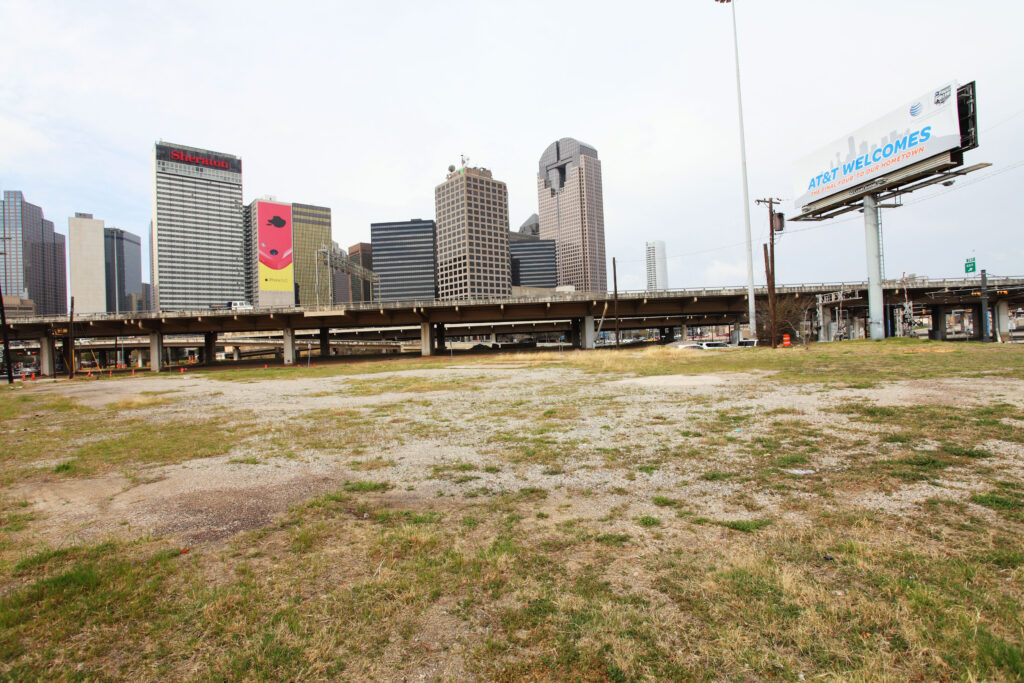The Dallas City Council will not vote next week on whether to endorse the Texas Department of Transportation’s plan to rebuild the downtown freeway I-345 in a below-ground trench. Some council members say they plan to push for an independent third-party study of the state’s proposal for the elevated roadway before voting on any resolution.
Councilman Omar Narvaez, who chairs the city’s Transportation and Infrastructure Committee, said he requested the item be removed from the February 22 consent agenda “to allow some of my colleagues to have more time to get questions answered … and to allow for a general public discussion prior to any vote.”
The consent agenda is composed of items that can be approved without discussion if an item is not pulled by a council member. The resolution was posted in Friday’s agenda, about four months after the City Council was first briefed on the proposal. This also could delay a vote on the matter until after the Council elections in May.
TxDOT’s preference is to trench the highway, which the state calls its “Refined Hybrid Option.” This would require removing the existing freeway and rebuilding it below-ground. The state anticipates construction to take about 10 years. This future of 345 has been in discussion for more than a decade, when urban planner Patrick Kennedy and real estate developer Brandon Hancock first presented the option to remove the highway and turn it into a boulevard to create more space for residential, office, retail, and other uses.
Ceason Clemens, the North Texas region’s top TxDOT engineer, has said the state studied that option but would not support it because traffic models predict it will increase congestion. The state also maintains that many of the 180,000 vehicles that use the highway each day start their mornings in southern Dallas and use 345 to get to their jobs at points north.
Some council members have questioned that logic. Last October, when the full Council was first presented the state’s preference, Councilwoman Gay Donnell Willis asked whether the trenching plan was “modeled after our land use of today or our land use tomorrow?”
“What if that changes tremendously,” asked Willis, Preston Hollow’s representative, “where you have great opportunities for jobs, shopping, et cetera in the southern sector? How do we model that?”
In a phone call on Tuesday, Councilman Chad West echoed that concern.
“People may not need to drive to Frisco or Far North Dallas or Plano for jobs in the future,” says West, who represents North Oak Cliff. “There may be plenty of jobs in South Dallas or the urban core.”
TxDOT’s engineers say a recent $30 million rehabilitation extended the freeway’s life by another 25 years. Removal proponents say the city should use that time to independently explore how the project fits with City Hall’s goals for economic development, housing, and lowering emissions.
“I’m not ready to go make a vote on this project, which is a generational project that’s going to affect not only my generation but also those after me,” says Councilman Jesse Moreno, whose District 2 includes Deep Ellum near the freeway. “We’ve seen this work in other cities as a boulevard option … how do we bring these two communities together that were torn apart in this city?”
TxDOT needs Council’s endorsement before it can slot the project into a funding schedule. From there, it will compete with other projects across the state for a pool of public money. The Texas Transportation Commission, the governor-appointed body that doles out funding to freeways and other large-scale transportation proposals, is generally unwilling to allocate dollars to projects that don’t have resolutions of support from the cities in which they exist.
The commission has also refused to fund projects that takes cars off freeways. Speaking in Austin during the Texas Tribune Festival last year, TxDOT Deputy Executive Director Brian Barth said investments in multi-modal transportation, walkability, and economic development tied to highway projects cannot come “at the expense of vehicular traffic.”
The state looks at its preference for a trench as a compromise. To meet the city’s economic development and connectivity priorities, the trenching idea includes engineering for 9 acres of developable land that would be built upon decks over the freeway, similar to the infrastructure of Klyde Warren Park. (Existing streets will connect over the highway, like they do around Central Expressway, but will include wide sidewalks, bike lanes, and other ‘Complete Streets’ elements, Clemens told the Council.)
Members of the City Council have questions regarding the cost of these decks, since Dallas will be responsible for paying for them. The state will only fund the highway. The hybrid plan also opens up another 8.7 acres of surplus land created once the highway ramps are removed.
But the nagging question for some on council is what the city of Dallas might be missing out on. Councilwoman Jaynie Schultz, who is a member of the transportation and economic development committees, says she wanted to hear from other “stakeholder planning groups, not just TxDOT.”
“This is a delay with additional information,” she says, “it’s not just a delay.”
Councilman Paul Ridley, who represents downtown and East Dallas in District 14, says he feels TxDOT’s plans are too focused on moving cars and overlook other potential benefits.
“They have their own agenda, and it’s clearly governed by what they perceive as the most efficient way for cars to travel through downtown,” he says of TxDOT. “There are a lot of other considerations that many other community members have and I think they have a need to see the counterpoint to TxDOT’s argument.”
Some others—Councilman Tennell Atkins, who chairs the Economic Development Committee; and Councilwoman Paula Blackmon, who is over climate—say they have not yet reviewed the resolution and are not ready to comment. Councilwoman Cara Mendelsohn of Far North Dallas, another member of the Transportation and Infrastructure Committee, says “there’s been a lot of work done on this and it’s clear this is the correct option for our city.”
For the last few years, the Texas Department of Transportation has been working with the city of Dallas to complete a study that determined which of its four plans it preferred for the freeway. The state was also in communication with Dallas Area Rapid Transit, the NCTCOG, and various neighborhood groups like Downtown Dallas Inc., the Deep Ellum Foundation, and Southeast Dallas Now.
But it’s now the City Council’s time to parse TxDOT’s proposal—and they’re starting with their foot on the brake.
Get the D Brief Newsletter
Author





